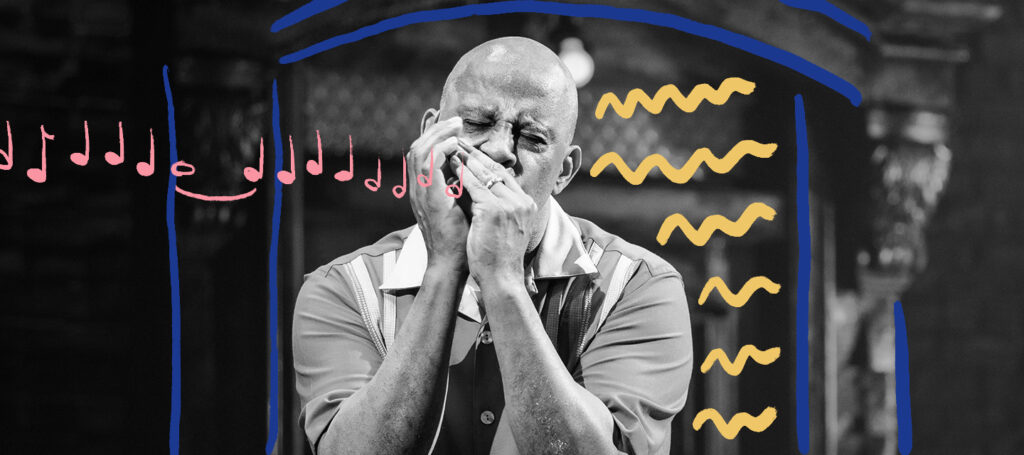


In ‘Lackawanna Blues’ Santiago-Hudson Builds a Memorial for the Forgotten
In 1983, in In Search of Our Mothers’ Gardens, Alice Walker, wrote: “We are a people. A people do not throw their geniuses away. And if they are thrown away, it is our duty as artists and as witnesses for the future to collect them again for the sake of our children, and, if necessary, bone by bone.”
In a similar search for his “Nanny’s” boarding house, playwright Ruben Santiago-Hudson wrote Lackawanna Blues around 1999; resurrecting, story by story, song by song, the life of Rachel Crosby, the woman who ran boarding houses up in Lackawanna, NY in the 50s and 60s. A woman whose genius lay in her kindness.
Accompanied by musician Junior Mack, Santiago-Hudson’s Lackawanna Blues is a two-man act, where the latter embodies one character after another in his bid to resurrect the world Ms. Crosby built for lives the larger world turned away—forgotten veterans, single mothers, people discharged from psychiatric institutions, formerly incarcerated men, a dog named Lady, and even a raccoon.
Santiago-Hudson’s narrative, which moves swiftly through years, lives, griefs, and joys, finds fitting punctuations in Mack’s guitar and songs. Sometimes, intercutting his storytelling, Santiago-Hudson joins in with his pocket harmonica.
Until 2001, Lackawanna Blues only had one run at the Public Theater. No producer seemed interested in “One guy playing 20-some roles…Not one costume change” and then 9/11 happened, and the country could do with some of Ms. Crosby’s story of an all-encompassing, magnetic kindness that engulfed everyone who came into its orbit.
Santiago-Hudson teamed up with Bill Sims and the duo played to packed houses for two years. In 2019, shortly after Sims’ passing, Santiago-Hudson brought back the story on stage, briefly, to help soothe the hopelessness of living in Trump’s America. Then, of course, the pandemic hit.
As the pandemic continues to rage on, our lives sustain themselves primarily on acts of kindness by innumerable nameless, faceless strangers who touch our lives in invisible ways. Santiago-Hudson, who grew up in one of Ms. Crosby’s boarding houses—32 Watson Avenue—builds a memorial to not just Crosby but to the hundreds of Black women who have built generations on their backs. Women whose endless giving and rare receiving has, unfortunately, found home first in countless Mammy caricatures before meeting a fitting tribute in Lackawanna Blues.
The play, with its 90 minute runtime, is also a quick reminder, in case anyone still needed one, of the insidious ways in which anti-Blackness forms the bedrock of America’s history. Every boarder, every character that Santiago-Hudson inhabits (including that of Ms. Crosby) is in a space of suffering because of America’s racism.
With a biting sense of humor, Santiago-Hudson veils criticism in jokes that make the audience laugh momentarily and then force them to question what or whose expense they’re laughing at. He is up on stage talking about Nat King Cole being attacked by a white audience in 1956, about a man whose brother was taken to court “for hurting a white man’s feelings” but it could well be 2021. But there is no Ms. Crosby to take us in with love and feed us some hot soup.
Lackawanna Blues convinces me that there is very little that Santiago-Hudson cannot do. What he does most masterfully is exorcising the graceful and benevolent ghost of a woman whose kindness in the face of racism and anger in the face of injustice are nothing short of radical. It is at that moment, that I miss the bodily presence of that woman—the real Ms. Crosby—on stage. The presence of those safe hands that fed, clothed, and housed people (“like the government if it worked”, as they say in the play) in the middle of times where each one of those rights have become contentious.
That, probably, is the play’s highest achievement. To make us yearn for a refuge that doesn’t quite exist. To, in turn, try and become that refuge because that is what our historical mothers have taught us. We are all searching for our mother’s gardens not just because we want to remember them but because we want to grow flowers again. We are all looking for Ms. Crosby’s houses, not just to live in them, but to learn how to build more of those, to be able to teach how to build more of those.
Keep Reading

‘Six’: They Run This Mutha (Yeah!)
Remember the first time you saw your favorite artist in concert? The tingling sensation that took over your body, the thrill of being in community with strangers, the expectation that your favorite songs will be performed. Going to Six feels exactly like that. Except, this time the artists in question have been brought back from […]
Read More












